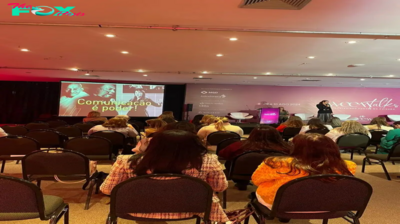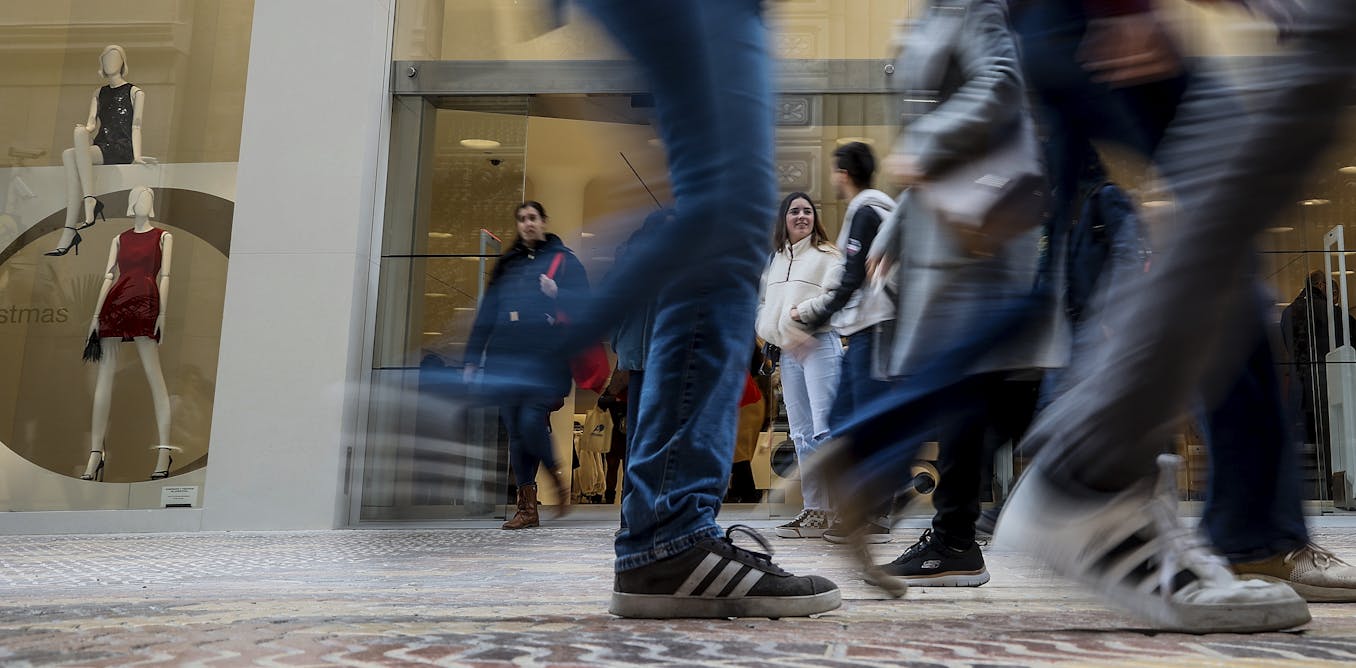Entertainment
First-rate forged and world class orchestra in compelling Dresden Don Carlo ŌĆō Seen and Heard Worldwide
 Germany Verdi, Don Carlo: Soloists, S├żchsische Staatsopernchor, S├żchsische Staatskapelle Dresden / Jordi Bern├Ācer (conductor). Semperoper, Dresden, 18.5.2024. (MC)
Germany Verdi, Don Carlo: Soloists, S├żchsische Staatsopernchor, S├żchsische Staatskapelle Dresden / Jordi Bern├Ācer (conductor). Semperoper, Dresden, 18.5.2024. (MC)
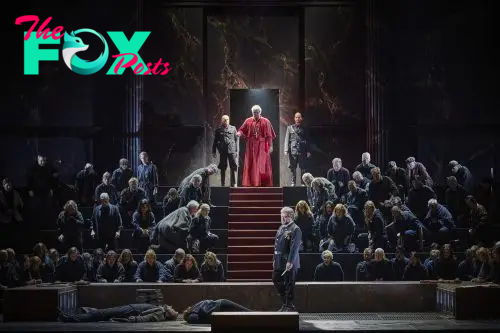
Bulgarian-German director Vera Nemirova and her design group have been answerable for this unique Don Carlo, a co-production with the Salzburg Easter Competition, premiered in 2020 and launched at Staatsoper Dresden in 2021.
In response to a prestigious fee from the Paris Op├®ra, Verdi in 1867 accomplished Don Carlos, a five-act grand opera to a French libretto, a mission related to people who proved so profitable for Meyerbeer and Hal├®vy. For his libretto Verdi seemed to Joseph M├®ry and Camille du Locle who primarily based their libretto on SchillerŌĆÖs dramatic poem with smaller sections primarily based on a Eug├©ne Cormon drama. At rehearsals for its premiere in Paris Don Carlos was deemed too prolonged to be sensible for audiences and alterations together with cuts had been required. Later Verdi subjected Don Carlos to quite a few modifications and revisions, and with its new title of Don Carlo used an Italian translation in variations for Naples (1872), Milan (1884) and Modena (1886).
For this revival of Don Carlo Nemirova and her designers adopted the four-act La Scala, Milan model of 1884 that used a libretto translated into Italian by Achilee de Lauzi├©res and revised by Angelo Zanardini. Act I used to be eliminated and NemirovaŌĆÖs manufacturing controversially included further orchestral music, particularly a brand new prologue written by composer Manfred Trojahn. This prologue served to visualise anew the Act I Fontainebleau scene from the five-act model the place Don Carlos met and have become betrothed to Elisabeth towards the backdrop of Spain and France being at warfare. There isn’t a dialogue with TrojahnŌĆÖs new orchestral prologue, and the assembly of Don Carlo and Elisabeth was represented by Altea GarridoŌĆÖs choreography the place two dancers sporting white costumes danced amid two rows of tall white flowers. TrojahnŌĆÖs unique music suited the opera being darkish and mysterious of a gathering depth. A gang of thugs assaulted the dancers and dragged them away. Throughout TrojahnŌĆÖs music, together with the pair of dancers on the stage was a simultaneous video projection on translucent materials of an ominous group scene of terrified males, girls and youngsters, sporting winter clothes, seen huddled collectively on a wooded hillside. One other very noticeable facet of the manufacturing was Frauke SchernauŌĆÖs costumes which have been of the interval across the 1500s as much as the interval, and thereafter a mixture of up to date garments have been worn.
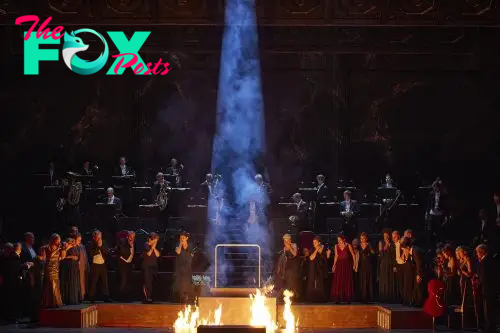
In opera all the time sinister is an auto-da-f├® scene, a public parade and burning in a woodpile of condemned heretics carried out by the Spanish Inquisition an act that occurred right here in entrance of MadridŌĆÖs Basilica of Our Girl of Atocha. Coming after the dramatic music of the auto-da-f├®, Trojahn had efficiently written a most affecting interlude for cello solo from one in every of MendelssohnŌĆÖs Tune with out phrases for solo piano. The stage was in gloom aside from a spotlit scene of a cello leaning towards a chair. Enjoying the interlude and spotlit too within the pit was first cellist concertmaster Norbert Anger. Productions which intrude with or deviate from a composerŌĆÖs intentions are usually not one thing I usually admire. However, I’ve made an exception for this Nemirova Don Carlo as Verdi himself set a precedent by authorising a number of variations of the opera.
Set within the sixteenth century, Don Carlo is a story of ardour, love and devotion that capabilities inside a tense local weather. Private emotions and beliefs rely for little. State and faith take priority and so they have clashed. Stage director Nemirova has singled out the phrase ŌĆśenergyŌĆÖ, this libretto is all about energy, inherited energy, the ability of affection and the way information is energy. We’re reminded by Nemirova in an interview that the rule of energy is equally relevant at this time, corresponding to individuals who have spoken out towards abuses of energy and sit in jail cells.
Set designs by Heike Scheele positioned the world of King Phillip II and Don Carlo in a monastery library with rows and rows of books from ground to ceiling and a smattering of heavy darkish furnishings, a visible theme sustained all through. The king lives in, what Scheele describes as a ŌĆśairtightŌĆÖ world, a court docket that’s and feels closed off, aside from a selected few. It’s unimaginable for the monarch and his court docket to flee this closely claustrophobic world. Essential too is the dynastic rule of the primary son succeeding his father as ruler. Right here Don Carlo is the son of King Philip II of Spain, who’s the son of Emperor Charles V and Isabella of Portugal.
It was Ivan Repu┼Īi─ć the conductor on the first efficiency of this Nemirova revival, who emphasised how Don Carlo is a darkish work and large in scale, like a grand opera and in contrast it to Aida. Any manufacturing of Don Carlo, explains Repu┼Īi─ć, wants six excellent soloists in a position to surmount the challenges of the work, a choose group that’s laborious to search out. Properly, the Staatsoper Dresden deserves credit score for assembling six such gifted singers.
Greek bass Alexandros Stavrakakis took the position of King Philip II who had married princess Elisabeth. Properly suited to the position, Stavrakakis was in splendid kind displaying his wealthy, low voice that was clear and carried its weight so properly. The king dominated over a big empire but felt betrayed by his spouse Elisabeth, collectively along with his brother and the ominous energy of the Inquisition. Deeply troubled and indignant Stavrakakis portrayed the king to usually chilling impact. Sticking in my thoughts was the purpose when the overwrought King Philip II fell to his knees, a damaged man.
French princess Elisabeth of Valois, though betrothed to Don Carlos, married King Philip II to kind a peace treaty between Spain and France. Russian born soprano Elena Guseva clearly gained the hearts of the viewers. Her superb voice along with pure stage presence resulted in a efficiency of the very best order. In her aria Tu che le vanit├Ā conosce Elisabeth is reflecting on her Fontainebleau assembly with Carlo. Producing a compelling degree of emotion Guseva appeared to have the viewers within the palm of her hand.
Romanian lyric tenor ╚śtefan Pop has appeared in quite a few Verdi and Puccini roles and right here sang the main position of Don Carlo. Inheritor to the Spanish throne prince Carlo is betrothed to princess Elisabeth and is completely crestfallen when she marries his father. All through, the energetic Pop gave a convincing portrayal of the tormented prince. Along with his attractively heat voice, projected with readability, Pop managed to seize CarloŌĆÖs damage and vulnerability.
Rodrigo, Marquis of Posa was sung by German baritone Christoph Pohl who benefited from his sturdy and resilient voice with a horny tone. Value singling out is the friendship duet between Rodrigo and Carlo Dio, che nellŌĆÖalma infondere amor that was marvellously executed, as stirring as any I’ve heard.
The position of the Grand Inquisitor, the top of the Spanish Inquisition, is a small however essential position, representing the ability of the Catholic Church. Our Grand Inquisitor dressed from slippers to hat in purple, was blind and senescent and used a strolling stick. Outstanding was the bass duet between Alexandros StavrakakisŌĆÖs king and the Grand Inquisitor, sung by Ukrainian Taras Shtonda. King Philip II requested how the church would react if he ought to kill his son and the Grand Inquisitor responds that the Inquisition can take down any king. Stavrakakis and Shtonda have been of their factor within the scene, filled with worry and menace.
Princess Eboli is ElisabethŌĆÖs girl in ready on the court docket, a schemer who’s secretly in love with Carlo. Russian mezzo-soprano Yulia Matochkina put her coronary heart and soul into the position of Princess Eboli and in her well-known aria O don fatale she revealed her wealthy mezzo-soprano creating appreciable drama.
Within the minor roles comprising Oleksandr Pushniak (Monk), Dominika ┼Ākrabalov├Ī (Tebaldo), Hyunduk Na (Girl dŌĆÖAremberg) and Joseph Dennis (Rely of Lerma) the usual was pleasingly excessive.
A brand new identify to me was Spanish conductor Jordi Bern├Ācer and his partnership with the Staatskapelle Dresden felt like a gathering of minds. This glorious Verdi efficiency was constant and resilient with reserves of stamina on this lengthy work, and I observed loads of nice element from the gamers too. Extremely reliable the Staatsopernchor demonstrated its prowess that was testomony to the teaching by Jonathan Becker.
This revival of Vera NemirovaŌĆÖs manufacturing of Don Carlo contained many admirable qualities along with the first-rate forged and world class orchestra. Such a compelling work, if I had the chance to attend this manufacturing of Don Carlo once more tomorrow, I definitely would.
Michael Cookson
Manufacturing:
Stage route ŌĆō Vera Nemirova
Creative help to Director ŌĆō Sonja Nemirova
Set design ŌĆō Heike Scheele
Costume design ŌĆō Frauke Schernau
Lighting design ŌĆō Fabio Antoci
Video design ŌĆō rocafilm
Prologue choreography ŌĆō Altea Garrido
Refrain director ŌĆō Jonathan Becker
Dramaturgy ŌĆō Kai Wessler
Solid:
Philip II ŌĆō Alexandros Stavrakakis
Elisabeth of Valois ŌĆō Elena Guseva
Don Carlo ŌĆō Stefan Pop
Rodrigo, Marchese di Posa ŌĆō Christoph Pohl
The Grand Inquisitor ŌĆō Taras Shtonda
The Monk (Charles V) ŌĆō Oleksandr Pushniak
Princess Eboli ŌĆō Yulia Matochkina
Thibault ŌĆō Dominika ┼Ākrabalov├Ī
Girl dŌĆÖAremberg ŌĆō Hyunduk Na
The Rely of Lerma ŌĆō Joseph Dennis
A Voice from Heaven ŌĆō Nikola Hillebrand
-

 Entertainment3h ago
Entertainment3h agoMan on the Inside Co-Stars Ted Danson and Stephanie Beatriz on Their Memorable ŌĆśFirstsŌĆÖ
-

 Entertainment3h ago
Entertainment3h agoEven a Magical Cynthia Erivo CanŌĆÖt Cast a Spell Strong Enough to Save Wicked
-

 Entertainment8h ago
Entertainment8h agoInside Out 2 to Frozen II: Top 15 Highest-Grossing Animated Movies
-
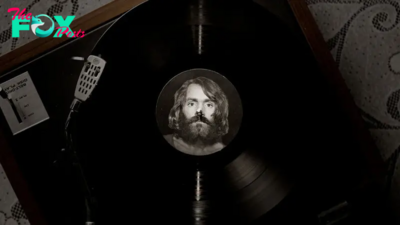
 Entertainment9h ago
Entertainment9h agoHow Docuseries Making Manson Complicates the Story Behind the Tate-LaBianca Murders
-
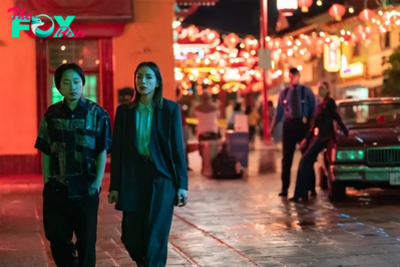
 Entertainment9h ago
Entertainment9h agoHow a Room Full of Lifeless Westworld Robots Inspired Charles YuŌĆÖs Interior Chinatown
-

 Entertainment13h ago
Entertainment13h agoHighest-Paid Podcasters in the World: Joe Rogan, Bill Simmons and More
-

 Entertainment13h ago
Entertainment13h agoFrom Camila Cabello to Sabrina Carpenter, Look at Shawn MendesŌĆÖ Dating History
-

 Entertainment19h ago
Entertainment19h agoA Look at the Dating History and Rumoured Relationships of BIGBANG Star G-Dragon


